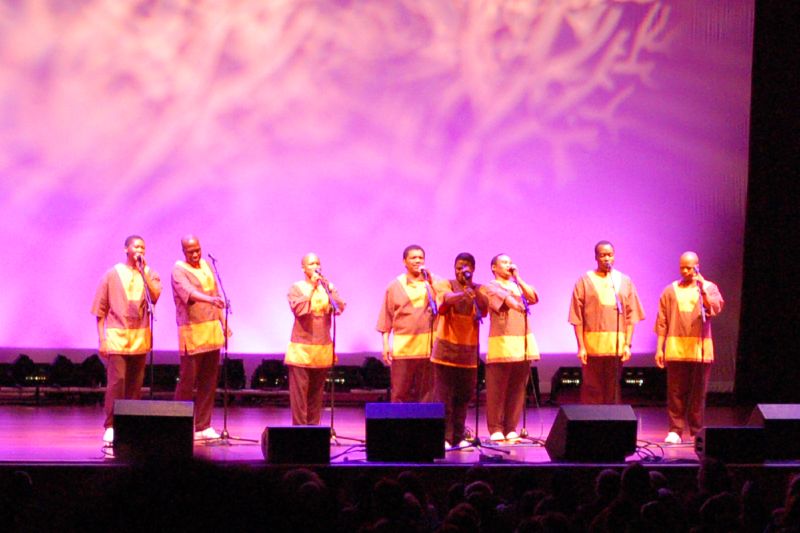|
Hilda Tloubatla
Hilda Semola Tloubatla (born 1942) is a South African ''mbaqanga'' singer, and the lead singer of the acclaimed group the Mahotella Queens. Tloubatla was born in Payneville, South Africa before moving to kwaThema township in 1951 as a result of (what was) the apartheid government's 'Group Areas Act' in the country.Info.gov.za, National Orders: Order of Ikhamanga, Hilda Tloubatl, 2005. Early life Tloubatla first began her music career by recording at the South African Broadcasting Corporation in the late 1950s and early 1960s. However, it wasn't until she joined the session musician team at Gallo Record Company in 1964 that Tloubatla first gained national fame. She was immediately recruited into a new female group, the Mahotella Queens, as a lead singer, along with fellow group members Nobesuthu Mbadu, Mildred Mangxola, Juliet Mazamisa and Ethel Mngomezulu. The five Queens were then paired with a mbaqanga instrumental team, the Makgona Tsohle Band and the gruff, "groaning" voca ... [...More Info...] [...Related Items...] OR: [Wikipedia] [Google] [Baidu] |
Mbaqanga
Mbaqanga () is a style of South African music with rural Zulu music, Zulu roots that continues to influence musicians worldwide today. The style originated in the early 1960s. History Historically, laws such as the Natives' Land Act, Land Act of 1913 to the Group Areas Act (1950) initially prevented black South Africans from integrating from different tribal communities, consequently making it almost impossible for most black native music artists to gain recognition beyond their tribal boundaries. The music genre mbaqanga developed during this time (1960s) and to this day most of the major record labels are white-owned companies with very few black artists that have contributed to their own material. In Zulu, the term ''mbaqanga'' means an everyday cornmeal porridge. ''Mbaqanga'' aficionados were mostly plebeian, metropolitan African jazz enthusiasts. Many of them were not permitted to establish themselves in the city, but they were unable to sustain themselves in the rural cou ... [...More Info...] [...Related Items...] OR: [Wikipedia] [Google] [Baidu] |
Mahlathini And The Mahotella Queens
Mahlathini and the Mahotella Queens (also known as Mahlathini Nezintombi Zomgqashiyo and Mahlathini and the Girls of Mgqashiyo) were a South African ''mbaqanga'' supergroup made up of the three musical acts linked together by talent scout and record producer Rupert Bopape at the Gallo Recording Company in Johannesburg, South Africa in 1964. The group composed of the following three distinct parts: * The late Simon "Mahlathini" Nkabinde (1937–1999), a "powerful singer" in the ''basso-profundo'' "groaning" style. * The girl group the Mahotella Queens (1964–present), the classic line up being the threesome, Hilda Tloubatla, Nobesuthu Mbadu and Mildred Mangxola. Still recording and performing internationally, the trio are noted for their distinct vocal harmony sound alternating between multi-part harmonies and unison vocals, guitar-led mbaqanga music, and fast stage dancing. * The instrumental band, the Makgona Tsohle Band (1964–1999), that is noted for creating the mbaqanga ... [...More Info...] [...Related Items...] OR: [Wikipedia] [Google] [Baidu] |
Living People
Related categories * :Year of birth missing (living people) / :Year of birth unknown * :Date of birth missing (living people) / :Date of birth unknown * :Place of birth missing (living people) / :Place of birth unknown * :Year of death missing / :Year of death unknown * :Date of death missing / :Date of death unknown * :Place of death missing / :Place of death unknown * :Missing middle or first names See also * :Dead people * :Template:L, which generates this category or death years, and birth year and sort keys. : {{DEFAULTSORT:Living people 21st-century people People by status ... [...More Info...] [...Related Items...] OR: [Wikipedia] [Google] [Baidu] |
1942 Births
Year 194 ( CXCIV) was a common year starting on Tuesday (link will display the full calendar) of the Julian calendar. At the time, it was known as the Year of the Consulship of Septimius and Septimius (or, less frequently, year 947 ''Ab urbe condita''). The denomination 194 for this year has been used since the early medieval period, when the Anno Domini calendar era became the prevalent method in Europe for naming years. Events By place Roman Empire * Emperor Septimius Severus and Decimus Clodius Septimius Albinus Caesar become Roman Consuls. * Battle of Issus: Septimius Severus marches with his army (12 legions) to Cilicia, and defeats Pescennius Niger, Roman governor of Syria. Pescennius retreats to Antioch, and is executed by Severus' troops. * Septimius Severus besieges Byzantium (194–196); the city walls suffer extensive damage. Asia * Battle of Yan Province: Warlords Cao Cao and Lü Bu fight for control over Yan Province; the battle lasts for over 100 ... [...More Info...] [...Related Items...] OR: [Wikipedia] [Google] [Baidu] |
Stimela
Stimela is a South African Afro-fusion band, founded during the 1970s by Ray Phiri, a self-taught guitarist. The band was formed when Phiri got together with drummer Isaac Mtshali, Thabo Lloyd Lelosa and Jabu Sibumbe, and they initially called themselves the Cannibals. The band started out as instrumentalists, but it later evolved to Afro-fusion when they joined forces with vocalist Jacob "Mparanyana" Radebe in 1975, continuing to work together for four years. The band kept going after Radebe died in 1978. They changed their name to Stimela after a life-changing experience in Mozambique when they were stranded in Maputo for three months. They had to sell all their belongings to take a train home. This trip was a watershed moment as it was where they conceived the new name for the band: train is translated as Stimela in Nguni languages. Besides the change in name, the band also expanded with new members Charlie "Sam" Ndlovu, Nana Coyote, Thapelo Kgomo and Ntokozo Zungu. With soulf ... [...More Info...] [...Related Items...] OR: [Wikipedia] [Google] [Baidu] |
Ladysmith Black Mambazo
Ladysmith Black Mambazo are a South African male choral group singing in the local vocal styles of ''isicathamiya'' and '' mbube''. They became known internationally after singing with Paul Simon on his 1986 album ''Graceland'', and have won multiple awards, including five Grammy Awards, dedicating their fifth Grammy to the late former President Nelson Mandela. Formed by Joseph Shabalala in 1960, Ladysmith Black Mambazo became one of South Africa's most prolific recording artists, with their releases receiving gold and platinum disc honours. The group became a mobile academy of South African cultural heritage through their African indigenous ''isicathamiya'' music. History Joseph Shabalala formed Ladysmith Black Mambazo because of a series of dreams he had in 1964, in which he heard certain ''isicathamiya'' harmonies (''isicathamiya'' being the traditional music of the Zulu people). Following their local success at wedding ceremonies and other gatherings, Shabalala entered th ... [...More Info...] [...Related Items...] OR: [Wikipedia] [Google] [Baidu] |
Graceland (album)
''Graceland'' is the seventh solo studio album by the American singer-songwriter Paul Simon. It was produced by Simon, engineered by Roy Halee and released on August 25, 1986, by Warner Bros. Records. In the early 1980s, Simon's relationship with his former musical partner Art Garfunkel had deteriorated, his marriage to actress Carrie Fisher had collapsed, and his previous record, ''Hearts and Bones'' (1983), had been a commercial failure. In 1984, after a period of depression, Simon became fascinated by a bootleg cassette of ''mbaqanga'', South African street music. He and Halee visited Johannesburg, where they spent two weeks recording with South African musicians. Further recordings were held in the United States, with guest musicians including Linda Ronstadt, the Everly Brothers, Louisiana band Good Rockin' Dopsie and the Twisters, and Los Angeles band Los Lobos. ''Graceland'' features an eclectic mixture of genres, including pop, rock, ''a cappella'', zydeco, ''isicatham ... [...More Info...] [...Related Items...] OR: [Wikipedia] [Google] [Baidu] |
Paul Simon
Paul Frederic Simon (born October 13, 1941) is an American musician, singer, songwriter and actor whose career has spanned six decades. He is one of the most acclaimed songwriters in popular music, both as a solo artist and as half of folk rock duo Simon & Garfunkel with Art Garfunkel. Simon was born in Newark, New Jersey, and grew up in the Queens, borough of Queens in New York City. He began performing with his schoolfriend Art Garfunkel in 1956 when they were still in their early teens. After limited success, the pair reunited after an electrified version of their song "The Sound of Silence" became a hit in 1966. Simon & Garfunkel recorded five albums together featuring songs mostly written by Simon, including the hits "Mrs. Robinson", "America (Simon & Garfunkel song), America", "Bridge over Troubled Water (song), Bridge over Troubled Water" and "The Boxer". After Simon & Garfunkel split in 1970, Simon recorded three acclaimed albums over the following five years, all of w ... [...More Info...] [...Related Items...] OR: [Wikipedia] [Google] [Baidu] |
Amaqhawe Omgqashiyo
''Amaqhawe'' was the 7th studio release by the South African isicathamiya group Ladysmith Black Mambazo. The album included songs such as "Ngi Boniseleni", which was later re-recorded (in 1987) as "Yibo Labo" ("These Are The Guys") on the album ''Shaka Zulu Shaka kaSenzangakhona ( – 22 September 1828), also known as Shaka Zulu () and Sigidi kaSenzangakhona, was the king of the Zulu Kingdom from 1816 to 1828. One of the most influential monarchs of the Zulu, he ordered wide-reaching reforms that ...''. Ben Shabalala Funokwakhe Mazibuko Abednego Mazibuko Headman Shabalala Enoch Shabalala Albert Mazibuko Milton Mazibuko Joseph Shabalala Russell Mthembu Fikile Groonwell Khumalo Jockey Shabalala Patrick Zondo Jabulani Dubazana Track listing # "Amaqhawe" ("Heroes") # "Sanibonani Maswati" ("We Greet You, Swaziland") # "Nansi Incwadi" ("Here is the Letter") # "Inkazimulo" ("Shining Star") # "Ngisele Ngedwa" ("I am left alone") # "Ngi Boniseleni" ("Show me") # "Ngiyekeleni" ("Leave ... [...More Info...] [...Related Items...] OR: [Wikipedia] [Google] [Baidu] |
Marks Mankwane
{{DEFAULTSORT:Marks ...
Marks may refer to: Business * Mark's, a Canadian retail chain * Marks & Spencer, a British retail chain * Collective trade marks, trademarks owned by an organisation for the benefit of its members * Marks & Co, the inspiration for the novel ''84 Charing Cross Road'' Places * Marks, Mississippi ** Marks station, an Amtrak train station in Marks, Mississippi * Marks, Russia Other uses * Marks (surname) * Grade, a teacher's evaluation of a student's performance * Marks (manor house), a manor house in London, England See also * Mark (other) * Marcks (other) * Marx (other) Karl Marx (1818–1883) was a German philosopher, economist and founder of Marxism. Marx may also refer to: __NOTOC__ People * Marx (surname), people named Marx Places * Marx Memorial Library, London * Marks, Russia, a town in Russia (also spelle ... [...More Info...] [...Related Items...] OR: [Wikipedia] [Google] [Baidu] |
Mahlathini
Simon "Mahlathini" Nkabinde (1937 or 1938 – 27 July 1999) was a South African ''mbaqanga'' singer. Known as the "Lion of Soweto", Nkabinde is the acknowledged exponent of the deep-voiced, basso profundo "groaning" style that came to symbolize mbaqanga music in the 1960s. Nkabinde was also a very active live performer in South Africa, recording and performing with the Mahotella Queens and the backing Makgona Tsohle Band from 1964 to 1971, and then again from 1983 to 1999. The Mahlathini and the Mahotella Queens act was propelled into international stardom in the wake of Paul Simon's 1986 ''Graceland'' album. Early career and life Nkabinde was born in Newcastle, KwaZulu-Natal and grew up in Alexandra, Gauteng. As a young boy, he began leading isicathamiya and mbube choirs at traditional Zulu wedding ceremonies. By the time he was a teenager, Nkabinde's voice was much admired. During the early 1950s, however, his voice became strained and was reduced to a growl. Initially, Nka ... [...More Info...] [...Related Items...] OR: [Wikipedia] [Google] [Baidu] |



